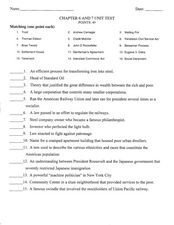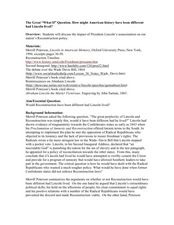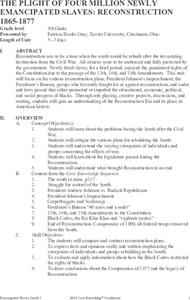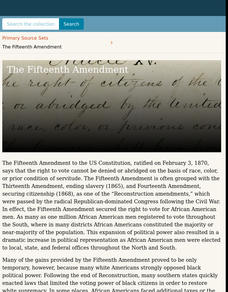University of California
Anti-Communism at Home
Have you ever been accused of something without cause? The sixth installment of an eight-part series asks scholars to create a museum exhibit on the anti-communist activities in the United States at the start of the Cold War. To make...
Curated OER
Court Documents Related to Martin Luther King, Jr., and Memphis Sanitation Workers
Young scholars read about the civil rights movement in their textbooks. They engage in a whole-class discussion of how nonviolent direct action can be a powerful tool for bringing about social, economic, or political change.
Curated OER
Bridges for All
Students describe how the brave word of one female Quaker served as a lifeline for fugitives before the Civil War. In this research lesson, students research several examples of the philanthropic work of individuals and organizations...
Curated OER
Constitutional Resources
Pupils explore the REpublican Era and the writing of the constitution and Billof Rights through various links and activities included in this collection.
Curated OER
A Lesson on Reconstruction Legislation and Amendments
Young scholars study the legislation and Amendments of Reconstruction period in America. In this Reconstruction lesson, students work in groups to dissect the Black Codes, an article in the US Constitution, as well as the 13th, 14th, and...
Curated OER
Chapter 6 and 7 Unit Test
In this Progressive Era and Big Business test worksheet, students respond to 15 matching, 3 multiple choice, and 4 short answer questions.
Curated OER
Fugitive from Labor Cases:
High schoolers examine the cases of Henry Garnett and Moses Honner, both of the 1850s. Students analyze the political climate building up to the Civil War through the lens of these similar cases with different outcomes.
Curated OER
Give Peace a Chance
High schoolers research protest songs of the Vietnam War era. They search for information on the artists and motivation for the lyrics. They interview people who remember the music from that era and bring back information they found.
Curated OER
The Great "What If" Question. How might American history have been different had Lincoln lived?
Eleventh graders study the Presidency of Abraham Lincoln. In this American History lesson, 11th graders analyze documents related to Reconstruction. Students participate in a debate on Reconstruction.
Center for History Education
The Freedmen's Bureau: Success or Failure?
What is freedom? The United States grappled with the question at the end of the Civil War after four million enslaved people were freed. Using circulars and images from the Reconstruction period, individuals examine how successful the...
Curated OER
Priorities and Power: Migrants and Voting
Students examine the African-American migrants entry into the political process. They summarize their findings in a short essay.
Curated OER
Who's Who In Black History
Fourth graders examine the life and achievements of promident African-Americans. As a class, they participate in acting out various scenes of a play which represents the Civil Rights era. They discuss how the world might be different...
Curated OER
An Act of Courage, The Arrest Records of Rosa Parks
Students research accounts on Rosa Parks and look for differences between the modern form and an older report on Parks. They discuss why information about race and nationality are collected on these and other forms.
Teaching Tolerance
Jim Crow as a Form of Racialized Social Control
Just because slavery was illegal doesn't mean it went away ... Jim Crow Laws took its place. An eye-opening lesson focuses on how Jim Crow Laws were used as a form of racial social control against African Americans in the United States....
National Woman's History Museum
Create your own Women’s History Museum
Celebrate Women's History with a museum display. Divide the class into seven groups and assign each a different historical topic/time period. Each group member researches a different woman of that time period and creates an exhibit that...
Facing History and Ourselves
Interracial Democracy
Radical Reconstruction, the 10-year period referred to after Congress passed the Reconstruction Act of 1867, saw the establishment of manhood suffrage, men voting without any racial qualifications. Southern states also rewrote their...
US House of Representatives
Black Americans in Congress Speak Their Mind
To conclude their study of Black Americans in Congress, groups select a statement made by one of the Members, examine the Member's profile on the provided link, and create a display that includes state represented, years of service, an...
Curated OER
The Plight of Four Million Newly Emancipated Slaves: Reconstruction - 1865-1877
Students study the Reconstruction Era after the US Civil War. In this Reconstruction lesson set, students examine the problems that were encountered by the South after the Civil War, look at different plans for Reconstruction, and...
Digital Public Library of America
The Fifteenth Amendment
Fifteen primary sources provide a context for a study of the Fifteenth Amendment to the United States Constitution. The packet captures the excitement for the changes promised by the amendment as well as the backlash against it.
Atlanta History Center
What if YOU Lived During Jim Crow?
Young historians envision what life was like for African Americans living in the Jim Crow South through hands-on, experiential activities.
Curated OER
Turbulent Times of the Sixties
Students explore 1960's America. In this American history lesson, students read about and research 1960's political and entertainment figures, social activism, the Civil Rights Movement, and environmentalism as they complete writing and...
Curated OER
McCarthyism: 60 Years Later
Explore legendary cartoonist Herb Block's bold challenge of McCarthy-era politics through this analysis activity. Two cartoons are included, along with talking points to prompt analysis and background information to help pupils "read...
PBS
The Sixties: Dylan Plugs in and Sells Out
Before Woodstock, there was Newport. Get plugged in to the social changes of the 1960s with a lesson that looks at Bob Dylan's performance at the 1965 Newport Folk Festival as a symbol of the radical changes that marked the era.
Curated OER
"The New Television Set" a Gateway to the Post World War II Era
Eleventh graders demonstrate their knowledge of the effects of television on the political, economic, religious, social, intellectual and artistic life of the US nation from the 1950's. Research how television shaped public opinion with...

























